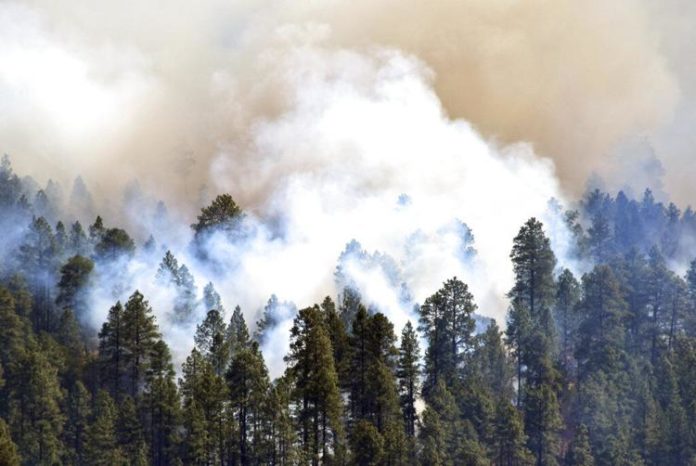
Alex Baumhardt, Stateline
This story first appeared in the Oregon Capital Chronicle.
Investing in private timberland in the West has become increasingly risky, according to a new study from Oregon State University researchers, with values declining by billions of dollars in the last two decades.
The economic value of private timberland in California, Oregon, and Washington has declined by about $11 billion since 2004, or around 10%, due to the threat of drought and wildfires, according to a new study from researchers at Oregon State University.
“The bulk of the damage is from altered risk expectations in land markets — not direct damage to the existing tree stock on the stand,” Yuhan Wang, a postdoctoral scholar at Oregon State and the study’s lead author, said in a news release. “That is a key and somewhat surprising finding.”
Wang and David Lewis, a natural resource economist at Oregon State, published their findings Nov. 7 in the Journal of Environmental Economics and Management.
Wang and Lewis said that climate change is responsible for at least half the decline in values when correlated with recent scientific studies on climate change impacts and attribution to natural disasters.
“This study shows that climate change is already reducing the value of Western forests,” Lewis said. “This isn’t a hypothetical future effect. These are damages that have already happened because it is riskier to hold assets like timberland.”
About one-third of all forests in the three West Coast states are privately owned and farmed for timber. The bulk of all timber harvested in the three states was from privately owned forests as opposed to state and federal forests.
Wang and Lewis looked at more than 9,000 private forestland sales of 10 acres or more that were made between 2004 and 2020 in the three states. Then, they compared the places where sales took place with data on drought and small and large wildfires nearby.
They found that, on average, the growing prevalence of drought had lowered the economic value of timberland by 1% since 2004 and increases in large wildfires had reduced timberland values nearly 9%. Declining values from wildfires were found to be related to the risk of wildfires rather than actual damages.
In California, increasingly large wildfires have led to the biggest losses in timberland value — about 14% over the last two decades. In western Oregon, where the bulk of the state’s private timberland is located, growing wildfire threats accounted for a nearly 8% decline in private timberland values, and drought was responsible for about a 1.5% decline.
Private timberland in western Washington experienced the mildest losses — about 5% from wildfire and less than 1% from drought. In eastern Washington, private timberland values have declined 8% due to the risk of large wildfires and 3.5% from ongoing drought.
Oregon Capital Chronicle is part of States Newsroom, a national nonprofit news organization.













